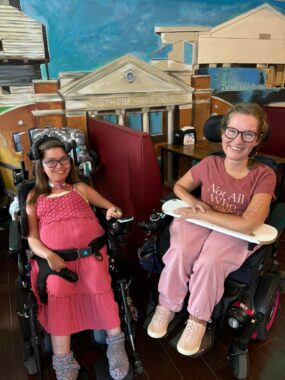Choosing to represent the disability community well
Whether we like it or not, we're all an influencer to someone
Written by |

Individually and collectively, it’s vital to be sensitive to what’s happening in the world around us. This awareness allows us to be empathetic and strive for change that improves society for ourselves and others.
The SMA and disability communities have long battled inequality and discrimination that could go unchecked if we — and our allies — didn’t remain sensitive to issues that need to be addressed. But when we allow our sensitivity to morph into bitterness and senseless anger, we’re likely no longer effective advocates.
Not only does our advocacy suffer when these emotions are allowed to fester, but so do our relationships. Even though there may be an understandable reason for how we feel, we should be mindful that it doesn’t cause us to lash out at others, whether it be our family, caregivers, peers, strangers, or the world at large. That isn’t justified, and it doesn’t help.
We don’t accomplish much of anything when we behave this way. Furthermore, what message does it send if this behavior is how we treat people who care about our well-being and desire to help us?
Wielding our influence wisely

Connie Chandler, right, and Halsey Blocher see each other at a local ice cream shop in Fort Wayne, Indiana, in July. (Courtesy of Halsey Blocher)
Last summer, my dear friend Connie Chandler, who also has SMA, spoke on a panel about building social media presence at the annual Cure SMA conference. During the discussion, panelists were asked how they felt about the term “influencer.”
While that makes many cringe, Connie presented an alternate perspective, sharing that whether we want to be or not, we’re all an influencer to someone. At least within our own circles, we’re representatives of the disability community, and people are looking to us as examples.
Connie then explored this idea further in a blog post titled “Being an ‘Influencer.’” Among other thought-provoking questions, she asked, “Are we influencing other wheelchair-users to be angry, highly-sensitive people, or people who seek out and appreciate the thoughtful efforts and kind considerations that they receive? Are we influencing able-bodied people to steer clear of us and fear offending us or inviting them into our world to learn something new and see things differently?”
If we’re all representatives of those living with disabilities, I believe we have a responsibility to represent our community well. Not only that, but we should also encourage others to do the same. We should aim to bring out the best in one another and present our strengths and compassion in unity.
That’s a conscious choice we can make with our words, actions, and attitudes. We can choose to angrily shake our fists and shout at everyone and everything that doesn’t instantly meet or understand our needs, or we can start an open-minded conversation in the hope of creating better outcomes. We can give up on making a difference, or we can team up and try again. We might make mistakes or get frustrated sometimes, but we can also choose to help each other move forward from these moments with grace and perseverance.
In my previous column, I wrote about some of the perceptions people have toward me as a disabled person. While we can’t entirely control how others perceive us, these choices are one of the things that hold some level of influence over others’ decisions and their responses to us. Whether it’s big or small, everyone makes an impact on the people they interact with. And as we make an effort to be good representatives, our network of influence grows and connects across the globe, possibly reaching farther than we will ever know.
With the world watching us, let’s choose to live in such a way that shows the goodness we want to see reflected back at us. Let’s keep our hearts sensitive to the experiences of others while also taking responsible, thoughtful action to make things better or offer support. And above all, let us always be kind.
Note: SMA News Today is strictly a news and information website about the disease. It does not provide medical advice, diagnosis, or treatment. This content is not intended to be a substitute for professional medical advice, diagnosis, or treatment. Always seek the advice of your physician or other qualified health provider with any questions you may have regarding a medical condition. Never disregard professional medical advice or delay in seeking it because of something you have read on this website. The opinions expressed in this column are not those of SMA News Today or its parent company, Bionews, and are intended to spark discussion about issues pertaining to spinal muscular atrophy.







Leave a comment
Fill in the required fields to post. Your email address will not be published.